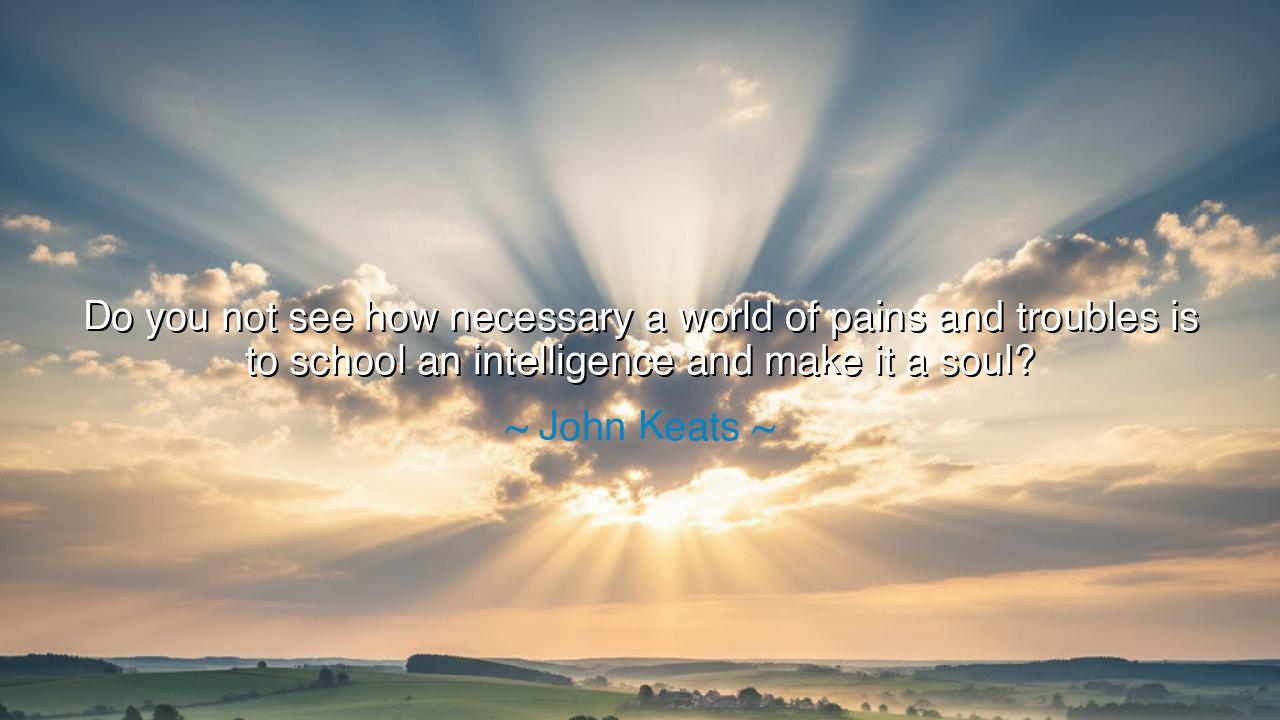
Do you not see how necessary a world of pains and troubles is to
Do you not see how necessary a world of pains and troubles is to school an intelligence and make it a soul?






The Fire That Forms the Soul
From the tender heart of John Keats, the poet who sang of beauty even as he walked with death, comes this immortal reflection: “Do you not see how necessary a world of pains and troubles is to school an intelligence and make it a soul?” In these words, the young poet unveils a truth that all wise men have discovered only through sorrow—that suffering is the teacher of the spirit, and that without trial, the mind remains untempered, like unshaped clay. Keats, whose life was brief yet blazing, spoke not as a philosopher in comfort, but as one forged in the furnace of grief. His own pains—loss, illness, and despair—became the crucible in which his intelligence was transformed into a soul.
The meaning of this quote lies in the understanding that hardship is not merely punishment, but preparation. It is the discipline of the divine, the schooling of the spirit. The intelligence alone observes and analyzes, but it is through pain that it learns empathy, compassion, and depth. The untested mind may be clever, but it is shallow; it is the suffering heart that becomes wise. Just as iron must pass through fire to become steel, so must thought pass through anguish to become soul. Keats believed that our purpose is not to flee sorrow but to be shaped by it—so that, through the ache of experience, we awaken to the greater harmony of existence.
The origin of these words lies in a letter Keats wrote to his brother in 1819, during one of the most sorrowful seasons of his life. He had lost his mother and brother to tuberculosis, and he himself was already marked by the same disease that would soon end his life. Yet instead of despairing, he looked upon his suffering with reverence. He called the world a “vale of soul-making”—a place where the human spirit, raw and incomplete, is refined by adversity until it attains its full radiance. To him, pain was not a curse but a forge; it was through enduring life’s tempests that the soul learns love, humility, and beauty. He saw that only through contrast—through darkness—can we truly perceive light.
History bears countless witnesses to this truth. Consider Nelson Mandela, who spent twenty-seven years in prison, stripped of freedom and hope. Yet from those years of pain, his intelligence became a soul, filled not with bitterness but with forgiveness. When he emerged from captivity, he carried not vengeance but wisdom, uniting a nation through grace. His suffering became his schooling, and from it he learned the lesson of Keats: that pain, when borne with courage, can awaken a deeper humanity. Without his trials, Mandela might have remained only a clever man—but through suffering, he became a great soul.
Keats’ insight mirrors the teachings of the ancients. The Stoics taught that adversity is the path to virtue. The Buddha proclaimed that suffering is the first noble truth, for through it one learns compassion. Even the heroes of myth—Odysseus, Heracles, and Prometheus—earned their wisdom not in pleasure, but through struggle. It is as though the universe itself demands this exchange: no soul may grow without the price of pain. To live without hardship is to remain unformed, untouched by the depth that makes one truly human. Therefore, those who have suffered deeply are often those who understand most profoundly.
Yet this truth is not one of despair, but of transcendence. Pain is the sculptor, but the masterpiece is joy. When Keats spoke of a “world of pains and troubles,” he did not glorify misery; he revealed its necessity in the alchemy of growth. The wise do not seek pain, but when it comes, they embrace its lesson. They ask, “What is this sorrow teaching me?” For every wound, if accepted with patience, becomes a passage toward awakening. Even grief, when faced with courage, can become the seed of compassion. Thus, what seems at first destruction becomes, in truth, creation.
Therefore, O seeker of wisdom, take this as your guiding flame: do not curse the trials of life, for they are the very instruments by which your soul is forged. When sorrow visits you, greet it not as an enemy but as a teacher. Let every loss make you gentler, every failure more humble, every pain more understanding. Know that each hardship you endure is shaping you into something vast and luminous—something eternal. The intelligence observes the storm; the soul is born from it.
And when at last the fires of life have passed, when your heart has been tempered by grief and yet still dares to love, you will understand what Keats saw so clearly—that a world of pains and troubles is not a punishment to flee, but a sacred school where man learns to become divine. For it is not the easy road that makes us wise, but the road of struggle, through which the mind becomes a soul and the mortal becomes eternal.






AAdministratorAdministrator
Welcome, honored guests. Please leave a comment, we will respond soon